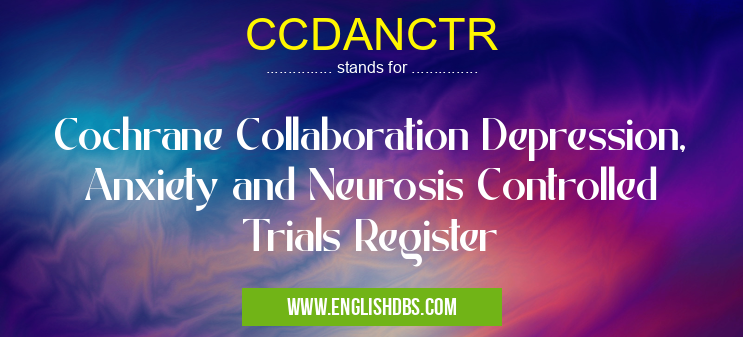What does CCDANCTR mean in SYNDROMES
CCDANCTR is an acronym for Cochrane Collaboration Depression, Anxiety and Neurosis Controlled Trials Register, a highly regarded database that compiles information on clinical trials related to depression, anxiety, and other neurotic disorders.

CCDANCTR meaning in Syndromes in Medical
CCDANCTR mostly used in an acronym Syndromes in Category Medical that means Cochrane Collaboration Depression, Anxiety and Neurosis Controlled Trials Register
Shorthand: CCDANCTR,
Full Form: Cochrane Collaboration Depression, Anxiety and Neurosis Controlled Trials Register
For more information of "Cochrane Collaboration Depression, Anxiety and Neurosis Controlled Trials Register", see the section below.
What is CCDANCTR
CCDANCTR is a comprehensive database that includes details of both published and unpublished randomized controlled trials (RCTs) on mental health conditions. It aims to provide researchers, clinicians, and policymakers with access to the most up-to-date and reliable evidence from clinical trials.
Key Features
- Comprehensive: Includes a vast collection of RCTs, covering a wide range of interventions for depression, anxiety, and related disorders.
- Evidence-Based: Provides high-quality evidence from well-designed clinical trials, ensuring the reliability of the information.
- Systematic: Trials are selected and included in the database using rigorous and systematic criteria, ensuring consistency and transparency.
- Accessible: The database is freely available online, enabling researchers and clinicians to easily search and retrieve information.
Benefits of Using CCDANCTR
- Informed Decision-Making: Clinicians can use the database to access the latest evidence on the effectiveness of different interventions for mental health conditions, guiding their treatment decisions.
- Research Advancement: Researchers can explore the database to identify gaps in knowledge and inform the design of future clinical trials.
- Policy Development: Policymakers can utilize the data to develop evidence-based guidelines and policies related to the management of mental health disorders.
Essential Questions and Answers on Cochrane Collaboration Depression, Anxiety and Neurosis Controlled Trials Register in "MEDICAL»SYNDROMES"
What is the Cochrane Collaboration Depression, Anxiety and Neurosis Controlled Trials Register (CCDANCTR)?
The CCDANCTR is a specialized database that contains high-quality controlled trials on the treatment of depression, anxiety, and neurosis. It provides researchers, clinicians, and policymakers with comprehensive and up-to-date information on the effectiveness of various interventions for these conditions.
What kind of studies are included in the CCDANCTR?
The CCDANCTR includes randomized controlled trials (RCTs) and controlled clinical trials (CCTs) that evaluate the effectiveness of psychological therapies, pharmacological interventions, and other treatments for depression, anxiety, and neurosis.
How are studies selected for inclusion in the CCDANCTR?
Studies are carefully assessed by a team of independent reviewers based on rigorous criteria. These criteria include the study's design, methodology, and relevance to the database's focus.
What information is available in the CCDANCTR?
The CCDANCTR provides detailed information on each included study, including study design, participant characteristics, interventions, outcomes, and risk of bias.
How can I access the CCDANCTR?
The CCDANCTR is available online through the Cochrane Library. It is free to access and can be used to search for studies by topic, author, or other criteria.
How is the CCDANCTR updated?
The CCDANCTR is updated regularly with new studies identified through systematic searches of medical databases and other sources.
Who uses the CCDANCTR?
The CCDANCTR is used by researchers, clinicians, policymakers, and other professionals involved in the treatment and management of depression, anxiety, and neurosis.
Final Words: CCDANCTR is an invaluable resource for researchers, clinicians, and policymakers in the field of mental health. By providing access to high-quality evidence from clinical trials, it empowers professionals to make informed decisions and contribute to the advancement of mental healthcare.
